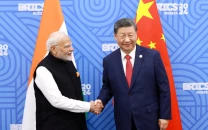'Brexit' could mean disintegration of EU or UK, says economist
People should not expect a recession or financial crisis in the wake of the "Brexit" vote, says Roubini

Nouriel Roubini, Professor of Economics and International Business of Leonard N Stern School of Business, gestures during the session 'India's Next Decade' in the Swiss mountain resort of Davos January 23, 2015.PHOTO: REUTERS
But people should not expect a recession or financial crisis in the wake of the "Brexit" vote, said Roubini, speaking at the World Economic Forum in China's northern city of Tianjin.
Post-Brexit: What it means for the Pakistani economy
British markets plunged on Friday, with sterling hitting a 31-year low in its biggest fall on record and UK stock futures pointing to a steep fall at the market open after Britons voted to leave the European Union.
Bonds also sold off sharply, pushing UK government borrowing costs sharply higher, as traders and investors grappled with the market implications of ‘Brexit’.
The pound had hit a 2016 high above $1.50 after an earlier opinion poll showed an outcome in favor of ‘Remain’, but fell nearly 17 cents from that peak as area counts came in and TV stations said the Brexit camp had won the landmark referendum.
Can London's first Muslim mayor become President Sadiq?
The British currency’s fall of almost 10 percent was also historic, marking a decline greater than anything seen since free-floating system of exchange rates was introduced in the early 1970s.
It was even bigger than on ‘Black Wednesday’ in 1992, when billionaire financier George Soros was instrumental in pushing the pound out of the Exchange Rate Mechanism.
London bankers working through the night said they hadn’t seen anything like the volatility sweeping across UK assets.
“It’s back to the future, we’re back to where we were in 1985,” said Nick Parsons, co-head of global currency strategy at NAB.



















COMMENTS
Comments are moderated and generally will be posted if they are on-topic and not abusive.
For more information, please see our Comments FAQ